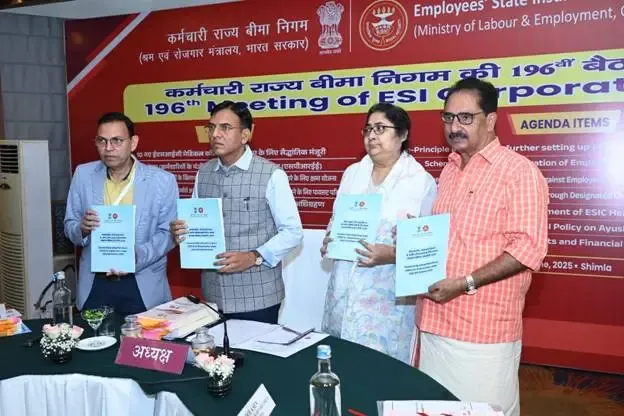How is Mandaviya's New Scheme Expanding ESI Coverage Across India?

Synopsis
Key Takeaways
- SPREE initiative expands ESI coverage.
- Amnesty Scheme – 2025 promotes compliance.
- Focus on voluntary registration and litigation reduction.
- Damages framework simplified to a fixed rate.
- Integration of traditional medicine in ESIC services.
Shimla, June 27 (NationPress) Union Minister for Labour and Employment Mansukh Mandaviya unveiled the SPREE (Scheme to Promote Registration of Employers/Employees) on Friday to broaden ESI coverage throughout India. Additionally, he approved the Amnesty Scheme – 2025, aimed at minimizing litigation and fostering compliance.
During a meeting convened in Shimla, the Employees’ State Insurance Corporation (ESIC) also ratified several crucial agenda items designed to enhance ESIC’s operational capacity, infrastructure, and healthcare services.
These initiatives include the simplification of the current damages framework, an updated ESI Policy of AYUSH – 2023, and a pilot partnership with charitable hospitals to improve healthcare access.
The ESIC has re-launched the SPREE initiative to extend ESI coverage nationwide. Initially introduced in 2016, this scheme successfully registered over 88,000 employers and 1.02 crore employees. The renewed SPREE will be operational from July 1 to December 31, 2025, providing a unique opportunity for unregistered employers and previously omitted workers—including temporary and contractual staff—to enroll under the ESI Act.
Employers who register during this timeframe will be considered covered from their registration date or as specified, while new employees will be covered from their respective registration dates.
This scheme emphasizes voluntary compliance over punitive measures, aiming to alleviate legal burdens, encourage formal registration, and strengthen relationships among stakeholders.
The ESIC also approved the Amnesty Scheme – 2025, a unique dispute resolution initiative set from October 1, 2025, to September 30, 2026, intended to lower litigation and boost compliance under the ESI Act. For the first time, it encompasses disputes alongside cases involving damages and interest related to coverage. Regional Directors have been empowered to withdraw cases where contributions and interest have been settled, as well as cases against insured individuals dating back over five years without issued notices.
The scheme’s objective is to reduce litigation by providing an out-of-court dispute resolution mechanism, thus allowing employers to pursue mutual settlements to facilitate ease of doing business and foster goodwill among all stakeholders.
Furthermore, the ESI Corporation has chosen to simplify its damages framework by replacing the old graded rates with a straightforward fixed rate. The maximum damage rate has been reduced from 25 percent per annum to 1 percent per month on the amount payable by the employer.
The Corporation also endorsed a proposal granting the Director General, ESIC the authority to allow applications beyond the 12-month limit following job loss under the Rajiv Gandhi Shramik Kalyan Yojana (RGSKY) on a case-by-case basis.
The Employees’ State Insurance Corporation has also approved the Revised AYUSH Policy of ESIC, which aims to integrate traditional medicine systems, such as Ayurveda, Yoga, Unani, Siddha, and Homoeopathy, into the ESIC healthcare framework. This initiative seeks to promote holistic, preventative, and wellness-oriented healthcare, marking a strategic advancement in the medical services provided to ESIC beneficiaries.
Additionally, the Corporation has approved the hiring of Yoga therapists and Panchakarma technicians in ESIC hospitals.
Moreover, a pilot project has been approved to enhance healthcare access for ESI beneficiaries by collaborating with charitable hospitals in underserved regions, offering comprehensive services ranging from OPD to emergency care.





